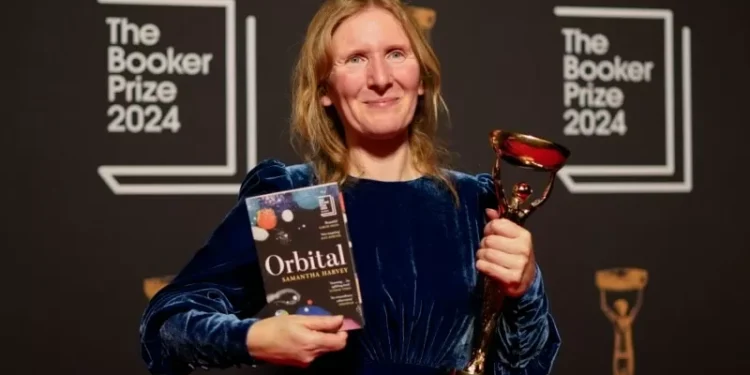LONDON — On Tuesday, the prestigious Booker Prize for fiction was awarded to British writer Samantha Harvey for her novel “Orbital.” The book, set aboard the International Space Station, explores the wonder and fragility of our planet and its inhabitants.
Harvey, who began writing the novel during the COVID-19 pandemic lockdowns, was awarded the 50,000-pound ($64,000) prize for her “space pastoral” about six astronauts orbiting the Earth. The confined characters experience 16 sunrises and 16 sunsets in a single day, trapped in each other’s company and mesmerized by the ever-changing views of our planet.
In her acceptance speech, Harvey shared that her inspiration for the novel came from reading books by astronauts and watching the live camera feed from the space station. She described the experience of seeing the Earth from space as a child looking into a mirror and realizing for the first time that the person in the mirror is herself. She also emphasized the message of the novel, stating that “what we do to the Earth, we do to ourselves.”
While the novel is not directly about climate change, it touches upon the issue through the lens of the Earth’s beauty and vulnerability. Harvey dedicated her win to all those who speak for the Earth and its inhabitants, and who work towards peace and dignity for all.
The five-member judging panel, chaired by writer and artist Edmund de Waal, praised “Orbital” as a “miraculous novel” that makes our world strange and new for us. Gaby Wood, chief executive of the Booker Prize Foundation, noted that in a year of global crises and record-breaking temperatures, the winning book is both hopeful and timeless.
Harvey, who has previously written four novels and a memoir about insomnia, is the first British writer since 2020 to win the Booker Prize. The award, open to English-language writers of any nationality, has a reputation for transforming writers’ careers. Past winners include literary giants such as Ian McEwan, Margaret Atwood, Salman Rushdie, and Hilary Mantel.
De Waal praised the “crystalline” writing and “capaciousness” of Harvey’s succinct novel, which at 136 pages in its U.K. paperback edition, is one of the shortest-ever Booker winners. He also encouraged readers to take their time with the book, stating that it “repays slow reading.”
The judges spent a full day deliberating and came to a unanimous decision in choosing Harvey as the winner. She beat out five other finalists from Canada, the United States, Australia, and the Netherlands, selected from a pool of 156 novels submitted by publishers.
American writer Percival Everett had been the favorite to win with his novel “James,” a reimagining of Mark Twain’s “Huckleberry Finn” from the perspective of its main Black character, Jim. The other finalists included American writer Rachel Kushner’s spy story “Creation Lake,” Canadian Anne Michaels’ poetic novel “Held,” Charlotte Wood’s Australian saga “Stone Yard Devotional,” and “The Safekeep” by Yael van der Wouden, the first Dutch author to be shortlisted for the Booker.
Harvey is the first female winner since 2019, and one of five women on this year’s shortlist, the largest number in the prize’s 55-year history. De Waal emphasized that factors such as the gender or nationality of the authors were not taken into consideration by the judges, stating that it was simply about the quality of the novel.
The awards ceremony, held at the grand former Victorian fish market in central London, Old Billingsgate, was a celebration of literature and the power of storytelling. The Booker Prize, founded in 1969, is open to novels originally written in English and published in the U.K. or Ireland. Last year’s winner was Irish writer Paul Lynch for his post-democratic dystopia “Prophet Song.”
As Harvey received her Booker trophy from last year’s winner, Paul Lynch, she was warned that her life was about to change dramatically due to the publicity boost from the award. In her overwhelmed state, Harvey remained grounded and shared her plans for the prize money, which included paying taxes, buying a new bike, and traveling to Japan.
In a year filled with challenges and uncertainties, the Booker Prize has once again reminded us of the power of literature to transport us to new worlds and perspectives. Samantha Harvey’s







